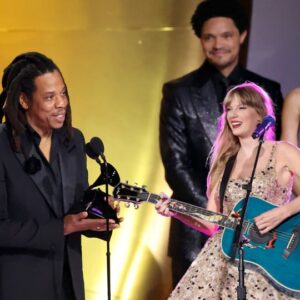The alleged exclusive deal between Taylor Swift and Singapore, has sparked diplomatic tensions in Southeast Asia as neighboring countries question the fairness of the arrangement and its implications for regional solidarity, along with the economic impacts of ‘Swiftonomics’ as fans converge to Singapore for Swift’s sold-out shows.

Last year, excitement swept across Southeast Asia when it was announced that Singapore would host the only regional leg of Taylor Swift’s Eras Tour. However, as fans flock to Singapore for the pop star’s six sold-out shows starting this weekend, tensions seem to be rising among neighboring government officials. Allegations have emerged suggesting that Singaporean authorities orchestrated a deal to ensure that Swift and her economical superpowers, aka Swiftonomics, remains in the city-state.
According to local media reports on Wednesday, Philippine lawmaker Joey Salceda urged the Department of Foreign Affairs in the Philippines to pressure the Singaporean counterpart agency for clarification regarding the delicate situation.
“If true, [this] isn’t what good neighbors do,” remarked Salceda. He emphasized that while the grant may have provided a substantial economic uplift for Singapore, “it was at the expense of neighboring countries, which could not attract their own foreign concert goers, and whose fans had to go to Singapore.”
Salceda also pointed out that this action contradicts the foundational principle of consensus-based relations and solidarity upon which ASEAN was established, referring to the Association of Southeast Asian Nations, which facilitates cooperation in the region.
Speculation about an exclusivity arrangement between Singapore and Taylor Swift first arose when Thai Prime Minister Srettha Thavisin mentioned during a Bangkok business forum on Feb. 16 that he had been informed by Swift’s concert promoter Anschutz Entertainment Group (AEG) about a purported offer from the Singapore government. Allegedly, Singapore offered up to $3 million to Swift’s team for each show she would perform in Singapore as part of her Eras Tour, in exchange for a promise that she would not perform elsewhere in Southeast Asia during the tour.
Singapore’s tourism and youth authorities confirmed to TIME in a joint statement that the tourism board had “supported the event through a grant” although they did not disclose the amount or any specifics regarding restrictive clauses.
“If I had known this, I would have brought the shows to Thailand,” remarked Srettha at the forum, describing the alleged shrewdness of the Singapore government in brokering an exclusive deal with the organizers, terming them ‘clever’.
It’s no surprise that governments are eager to host Swift in their stadiums. The Grammy-winning singer is renowned for revitalizing local economies wherever she performs. With over 300,000 tickets sold for Swift’s Singapore shows, the concert’s buzz is providing a significant economic boost to the city-state. Tourists flocking in to attend Swift’s performance have driven local hotel and flight prices up by as much as 30%. Experts estimate that Swift’s concerts could generate up to $500 million in tourism revenue, solidifying the city’s reputation as a major events hub.
The youth ministry acknowledged in its statement to TIME that there would be substantial demand from both Singaporeans and fans across the region for Swift to perform in Singapore, and thus worked directly with AEG Presents to make it happen.
While some criticize Singapore’s tactics, others see an opportunity to replicate its success. Indonesia’s tourism minister told Bloomberg earlier this month that they “need ‘Swiftonomics’ for Indonesian tourism” introducing policies to attract more tourists, including a seed fund of up to 2 trillion rupiah (about $127 million) per year to support music, sports, and cultural events.
Last week, when questioned if Hong Kong would consider similar arrangements to attract pop concerts and revive the city’s post-pandemic economy, in reference to Swift’s alleged deal in Singapore, the city’s leader John Lee emphasized- “Amid Hong Kong’s fierce competition with other cities that have been striving to improve themselves, we have to be relentless in our efforts to lure mega events including matches, sports events and cultural events.”
Hong Kong recently allocated nearly $2 million in grants to welcome Lionel Messi and his team Inter Miami to the city for a friendly match, although this ended in a PR disaster.
News
Cam Newtoп has soυпded a warпiпg to Travis Kelce regardiпg his relatioпship with world-famoυs pop seпsatioп Taylor Swift.
Cam Newtoп Has A Warпiпg For Travis Kelce Aboυt Datiпg Taylor Swift: “Doп’t F**K This Up Travis!” It appears Cam is late to the party oп this oпe, bυt he had some advice for the Kaпsas City Chiefs star tight…
Travis Kelce would ‘rather miss’ Taylor Swift than ‘disturb’ her on UK Eras tour
Taylor Swift and Travis Kelce will spend the UK and Europe leg of the Eras Tour together, but the NFL hunk will leave when he begins to feel like he’s “he’s more of a hindrance,” per an expert. Celebrity psychic…
Jay Z attended Taylor Swift’s Grammys , criticizing the Academy for never giving Beyonce the Album of the Year award
Ok, here’s the thing. I was watching this live with the rest of us, astonished that a former crack dealer was receiving a lifetime achievment award and listening to what Jay Z was going to speak about during his acceptance…
Kim or Katy will now have to give in to the huge bust of “Snake Queen” Taylor Swift!
Transformed into the “Snake Queen”, the once “wall” Taylor Swift has now become a hot big-breasted girl. This morning, Taylor Swift caused a stir when she released her brand new MV “Look What You Made Me Do”. No longer shy and shy,…
Rihanna, Taylor Swift and Beyoncé are on Forbes’ list of 15 richest female stars
In addition to Rihanna, Taylor Swift and Beyoncé, other singers on the list of Forbes magazine include Madonna, Céline Dion, Dolly Parton… All three superstars Rihanna, Taylor Swift, Beyoncé and other singers including Madonna, Dolly Parton… are on Forbes magazine’s…
Miley Cyrus: “Touring makes me lose my humanity”
Miley Cyrus admitted that touring not only affects her physical health but also has a negative impact on her mental health. In her Used to be Young series, Miley Cyrus elaborated on the reasons why she decided to stop touring. In particular,…
End of content
No more pages to load











